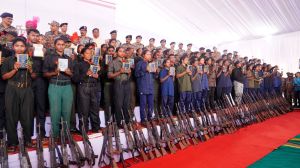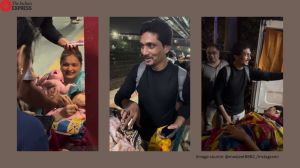The new IAS in the Block
In a small village in northern Rajasthan, you can feel Teliashutosha’s sense of relief. He is into Day 3 of his first job—as a sub...

In a small village in northern Rajasthan, you can feel Teliashutosha’s sense of relief. He is into Day 3 of his first job—as a sub-divisional magistrate in Alwar district—and is already amending his native Goan disdain for rain. In these routinely parched lands, every drop matters. In this second week of August gathering clouds are lowering over these semi-arid tracts in the Aravallis, and it’s official. The drought was a passing scare. The clouds continue to carry rain, the bajra crop has been salvaged, and the johads, traditional water-harvesting structures, are filling to capacity for the first time in years. The wise men of the village can now furrow their brows over other problems. And this is their moment to procure a hearing.
Teliashutosha, Indian Administrative Service, Batch of 2002, newly appointed SDM of Thanagazi, is at the village school, on a surprise check to see that there are no discrepancies in the electoral rolls being updated.
Kalu Ram is reciting his entire family tree. Yes, Yogesh Kumar is his brother, he tells the SDM. You sure he doesn’t reside elsewhere? No. Hmm? No. “The electoral rolls are so important in panchayats,” explains the SDM. “There are 12-13 wards in a village, and three-four votes can make for a losing difference.”
Fresh from his two-year training in Mussoorie, he is one of 60 IAS officers who have fanned out across India this month to assume charge as subdivisional officers. For some, like him, it’s been hectic but smooth acquaintance with the job. For others, like some batchmates of the Gujarat cadre, it’s been a dive into the deep end.
Thirty years later they will have climbed up the steel frame to take charge of key ministries and states. Today, as they belie their 20-odd years and gravely assume the manner of seniors, deploying studied expressions to convey that they are in charge, resisting both giggly impulses and expressions of twentysomething confusion, two Indias are meeting. They are straight out of medical and engineering schools, liberal arts and management courses. They are part of the first generation to have come of age post-liberalisation. From urban and small-town India, they have been touched by economic and social reform. In university and in the foundation course at the Lal Bahadur Shastri Academy at Mussoorie, they have deliberated on the retreat of government from key sectors in the economy and in civil society.
If they come to India with old certainties gone, the India they find too is changed. In first interactions with people and places, it stares them in the face. In Thanagazi, for example, Teliashutosha will in the course of this day find that for his villagers government is no longer mai-baap. They have no money for extras, but they will point him to a negotiating role between themselves and non-governmental organisations at work across Rajasthan. They will illustrate the change with quiet partnerships between volunteers and government schools which have drawn away dozens of children from private schools back to state-run centres. They will file into his bachelor’s pad at day’s end, asking not that he intervene, but that he make sense of their court disputes. And in their thirst for change, they will silently implant ideas into his head for the formation of a cooperative for local carpet-makers to minimise their reliance on middlemen.
As he begins his tour, Teliashutosha says, “We are not agents, but facilitators of change.” In their demands on him today, the villagers will echo the sentiment.
Others locate it in adversity. Next door, in Gujarat, Jai Krishna Shivhare has taken over as SDM, Dholka, and Lochan Singh Meena as SDM, Rajkot. Shivhare, originally from Banda district in UP, spent his first day in office waist-deep in flood waters. ‘‘There’s a lot of water in these villages and we are trying to shift affected people to higher ground,’’ he says. ‘‘But it’s a good experience to be in this crisis-like situation, meeting people and officials all day.’’
On his first day in the job, Meena was called to take key decisions on the Janmashtami mela — the biggest festival of Saurashtra, held annually in Rajkot. More than seven lakh people come to Rajkot to witness the mela. But Meena isn’t fazed and first impressions encourage him along: ‘‘People are good in Rajkot.”
|
|
|
Some things never change. The key to direct engagement with people’s problems is the same: reaching out , SDM, |
|
|
The Listening Years
The bare specifics of this rite of passage for the men and women who will rule India remain unchanged since the days of the Raj. ICS historian Philip Mason, profiling an SDO’s job in the 19th century, could well be enumerating the responsibilities of 2002 batch today: “It was his duty to see that the land records were kept up to date and in good order, that all disputes were settled without disturbance of the public peace, that the ferries were run with a minimum of inconvenience and extortion, that the pounds, schools (etc) really were in existence and were properly maintained.”
On this rainy Wednesday in Independence Day week, however, as Teliashutosha surveys his subdivision, as he affirms fidelity to these old tasks as a member of an inheritor service to the colonial ICS, his people will give him instruction in the dynamics of a rural populace not just impatient for change, but also keen to participate in mapping change.
Word has spread that the SDM is around, and villagers flock into the school compound. District training in Jodhpur has evidently familiarised 27-year-old Teliashutosha with the manners and sensibilities of Rajasthan. A taciturn village elder is guided courteously to a high chair. A man who exudes influence is nudged into garrulity with a gentle, “boliye”. Well, there are these two handpumps installed by an NGO. Their pipes keep getting corroded, so they are frequently rendered useless. The water is sweet, what a waste. A man amongst the growing assembly chimes in, but there are the government handpumps. The water there is brackish, it has high flouride content, adds another, but the pipes are of high quality. For just a few minutes the clouds part, and in the sunlit drizzle, the puzzle is solved. Why can’t we use the government pipes for the NGO pumps!
“You have to listen to them,” says Teliashutosha later. “People don’t just complain without reason. They’d be very satisfied if someone would hear them out, give them the facts. In these parts villagers have great confidence in the impartiality of the administration.”
Just yesterday, he recounts, agitated men from another village arrived at his office. A family was encroaching on village land, and they could not bear it. Promising to arrive at the spot (aka mauqa, that talismanic word that has served generations of district officers so well), he returned them to their homesteads. When he arrived at the village he found the errant family had spilled over territorially because there were just too many of them to be accommodated in the original home. He heard them out, and promised he’d try to see something was done about their space constraints. But meanwhile, would they remove their belongings? They would, and they did!
Similarly, in this Badgasai school today, the men say just four teachers service eight classes. Two more are required and they made inquiries with a local NGO that trains and provides teachers. The NGO, however, wants the village to contribute some of the salary so they see teaching as an investment they must maximise. Silence ensues. How much would it cost, asks the SDM. Heads nod at this query as he drives away, leaving behind a gathering given over to calculations and dreams of functional literacy.
People’s aspirations are rising and they keep the district officer, that fabled link between them and higher bureaucracy/polity, informed. Manisha Trighatia agrees. In her first week as SDM, Bassi Pathana, in Punjab’s Fatehgarh, she picks up the threads of decades: “In some ways, some things never change. In the 1950s, IAS officers probably encountered a different world, but the key to direct engagement with the people’s problems remains the same: reaching out to them. Actual physical travel into the field is important.”
Yet hazards remain. Mohammad Shaheen, a former executive with Ashok Leyland, has just taken up the reins of office as under secretary, food and supplies in Haryana. But memories of his district training days flood in: “Maybe with the extensive development in the field of communications and road network, officers are now not required in the field as they were in the past. As a tehsildar, when I visited interior areas of the district, I touched certain parts where people complained that they hardly get to see the officers.”
Raiders of a New Gazetteer
Attendant to this constant information gathering — from patwaris, panchayati raj institutions, local cooperatives, private citizens — is the need to keep plugging knowledge gaps. ICS men documented India as they found it, providing first drafts of gazetteers surveying a district’s history, people and much besides. Now that documentation must be upgraded. In Thanagazi, for instance, no one appears quite certain about the provenance of the burnt out remains of a fort that broods over the town from a lonely hilltop. Residents speak of a Commander Ghazi Khan and trace the town’s name to him. In this search for Thanagazi’s past lies the possibility of forward linkages. Sariska Tiger Reserve is just 10 km away, on an average day in this off-season gets 600 tourist vehicles. No one ventures further down the road to Thanagazi. No one takes a detour to shop for souvenirs from its carpet weavers. They perhaps don’t know the riches it bears.
Fifty seven years after Independence the discovery of India goes on.
With and






- 01
- 02
- 03
- 04
- 05

























